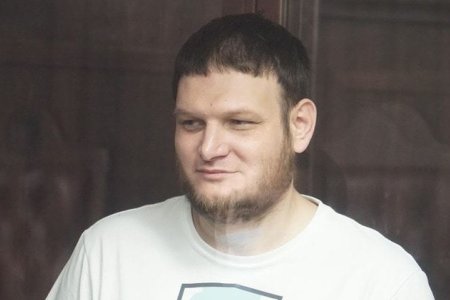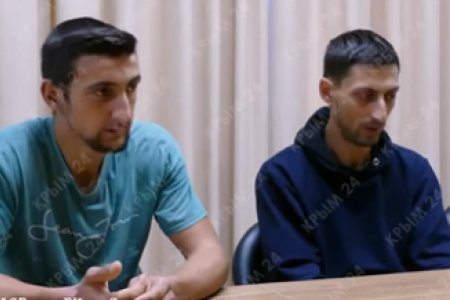
Russia’s justice ministry is pushing through a draft bill which will formally prohibit those convicted of so-called ‘extremism’ and ‘foreign nationals’ of the right to be imprisoned closer to their families. Crimean Tatar and other Crimean political prisoners have long been imprisoned thousands of kilometres from their homes, with Russian courts violating Russia’s commitments under international law by rejecting the prisoners’ applications to at least be imprisoned closer to their families. Russian legislation is now set to formalize the total violation of prisoners’ right to family life, with the move specifically targeting both Ukrainian and Russian political prisoners.
Russia’s cabinet of ministers was reported on 9 June to have introduced draft bill No. 38726-8. This proposes to ban those convicted of ‘extremism’, as well as foreign nationals and stateless persons from being transferred to penal institutions closer to where their families live. The amendments are, purportedly, aimed at “ensuring legality and law and order” in penal institutions, and “at preventing the circulation in them of extremist and terrorist ideology.”
At present, prisoners are, at least in theory, allowed once during their sentence to ask to be moved to a prison colony in the region where their families live. It seems that an exception is already made for those convicted of ‘terrorism’ or particularly grave crimes. The bill will broaden the list of those who are not entitled to apply for such a transfer to ‘foreign nationals’ and to those whom the current Russian regime calls ‘extremists’.
Such restrictions on ‘particularly grave criminals’ is curious, as that category have been able to obtain presidential pardons and their freedom, as well as more pay than they could otherwise hope for, by agreeing to fight in Ukraine.
There may possibly be a few Russian citizens whose convictions on terrorism charges were warranted. With respect to occupied parts of Ukraine there are none, and all Crimean Tatars and other Ukrainians, including a substantial number of Ukrainian prisoners of war, are political prisoners. Russia’s legislation on so-called ‘extremism’ is so flawed that it is probably fair to assume that all Russians convicted of such charges are also political prisoners.
Russia’s justice ministry itself acknowledges an increase of 876 ‘foreign nationals and stateless persons’ sentenced to terms of imprisonment over the past three years. It remains silent about the significance of three years, although the increase is doubtless due to the number of Ukrainian civilians abducted after Russia’s full-scale invasion of Ukraine and later sentenced on fabricated charges. The real number of Ukrainian civilians abducted is much higher, however Russia is continuing to hold many incommunicado without any charges or contact with lawyers. It is also, unfortunately, likely that some of those abducted were killed immediately, or were later tortured to death. The ministry’s figure probably also includes Ukrainian prisoners of war whom Russia has illegally ‘put on trial’ on preposterous charges, laid under Russian legislation.
The ministry also pointed to a supposed concentration in some maximum-security prison colonies of up to 48 percent prisoners from Central Asian republics, claiming this to be due to the current “possibility of moving from one colony to another”. This seems a rather implausible excuse for yet another restriction on people’s rights as any such transfer is to be close to family. A significant percentage of so-called ‘migrants’ from Central Asia live in the Russian Federation in order to find work to support family back in their home country.
RBK earlier reported that the proposed changes would be to Article 73 of Russia’s criminal procedure code. This purportedly envisages that prisoners serve their sentences in regions where their relatives live. While Article 81 states that they should spend the entire sentence in one prison colony, there are provisions in these articles for the above-mentioned opportunity to once apply to be moved closer to relatives.
It transpires that part 4 of Article 73 provides a considerable number of exceptions to this right, including essentially all of those articles used against Ukrainian political prisoners (‘spying’; ‘treason’; so-called ‘terrorism’, and others). These appear to have been added in 2018, probably to enable Russia which was, until its full-scale invasion of Ukraine, a member of the European Court of Human Rights, to violate a vital ECHR ruling from March 2017. That found that imprisoning people thousands of kilometres away from their families is a violation of their right to family ties.
While the new bill, when passed, does formally deny any Ukrainians abducted from occupied territory, the possibility of at least being closer to their families, in practice it is not clear that any such right was ever honoured. The vast majority of Crimean Tatar and other Ukrainian political prisoners have been ‘tried’ on spurious ‘terrorism’; ‘spying’ or ‘sabotage’ charges and are imprisoned thousands of kilometres from their families and homes. Russia has made it all but impossible to live on occupied territory without taking Russian citizenship, so most Crimeans were ‘tried’ as though Russian. There have, however, been a large number of lawsuits with Crimean Tatar political prisoners, such as imprisoned Crimean Solidarity journalist Remzi Bekirov, challenging their imprisonment in Siberia. All such lawsuits to date have been lost, but on a variety of pretexts which did not include part 4 of Article 73. Where Ukrainian political prisoners are concerned, Russian ‘judges’ clearly consider the likely response of those in higher places and / or the FSB, rather than the law.
The brutality is shocking. Crimean Tatar civic journalists and activists, other Ukrainians imprisoned for their pro-Ukrainian views, are held in appalling prison colonies or prisons thousand of kilometres and days of travel away from their families. In most cases, women have been left bringing up children by themselves, and the cost alone of travelling with the children to Siberia or other distant corners of the Russian Federation is prohibitive. Such visits are also strictly limited, and the journey to the prison colonies extremely arduous, meaning that for many elderly parents of political prisoners, there is no possibility of seeing them at all.



